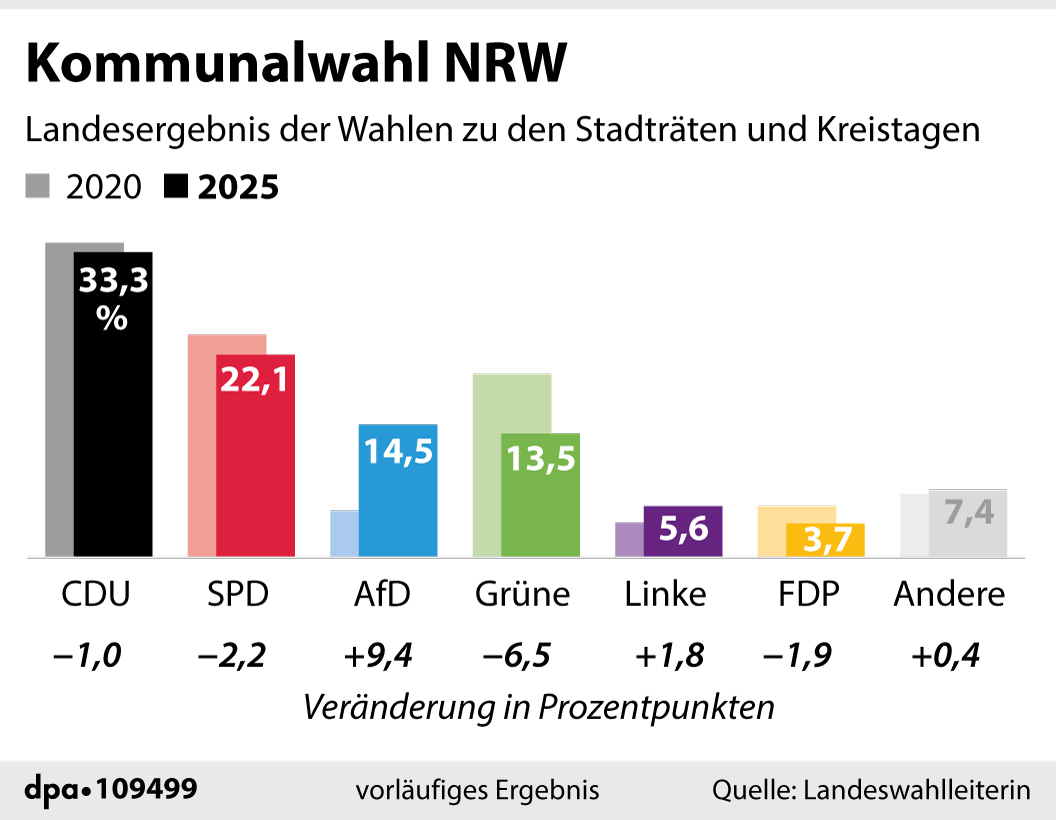The Christian Democrat Union (CDU) has maintained its position as the strongest political force in the western state of North Rhine-Westphalia following local elections on Sunday. The leading conservative party, which also heads Germany’s federal government, took one out of three votes in municipalities across the state (or 33.3 percent overall), according to preliminary results known on Monday morning.
The centre-left Social Democrats got 22.1 percent of the vote overall, followed by the far-right Alternative for Germany (14.5 percent) and the Greens (13.5 percent). Left party candidates got 5.6 percent and the Free Democrats got 3.7 percent. Votes for “other parties” or independent candidates amounted to 7.4 percent.
Historically low votes for centrist parties
While the CDU and SPD maintained their number one and two positions, the centrist parties did see their total percentages slip slightly compared to the last local elections in 2020 – the CDU lost one percent of votes and the SPD lost 2.2 percent.
According to a report by news outlet WDR, this amounted to the worst overall election result for both parties in Germany’s most populous state since 1946.

The Greens suffered significant losses across the board, having lost 6.5 percent of the votes compared with the previous election.
Meanwhile the AfD saw a significant increase, its share of total votes having increased significantly (plus 9.4 percent).
The far-right party is still far from leading the polls in most cities in the western state, but it did more than double its result from five years ago. In Gelsenkirchen, Duisburg and Hagen AfD politicians have a shot at winning the mayor's seat in run-off elections that are soon to follow. In each of these cities SPD and CDU candidates had higher first-vote counts, according to initial results on Sunday.
The AfD’s successes in the Ruhr area have been described as a blue wave, with the anti-immigration party having achieved around 20 percent of the vote in some regions.
Only in Münster and Cologne, Green candidates got the highest number of first votes.
Both cities stand out as Green bastions surrounded by CDU dominant municipalities on all sides.
Asked about his secret to success, Tilman Fuchs, the Green mayoral candidate for Münster who won the most first votes there, told Spiegel that the city is doing “comparatively well" and therefore “people are perhaps more open to progressive ideas, climate protection and the transport turnaround”.
READ ALSO: What's considered a good salary for foreigners in Cologne and Düsseldorf?
In the centre of the state, the SPD leads in Duisburg and Dortmund and some surrounding municipalities.
Summing up the election in comments made on television, Prime Minister Hendrik Wüst (CDU) suggested that it showed that his party was “still the number one municipal party”.
But he tempered his celebration in noting that issues such as poverty, migration, social systems and housing must be addressed and solved by politicians.
On the topic of the AfD’s continued gains he suggested that the centre parties “cannot sleep peacefully”.
According to preliminary figures, voter turnout rose to 56.8 percent – up nearly five percent from 2020, and the best turnout in NRW local elections since 1994.

Comments